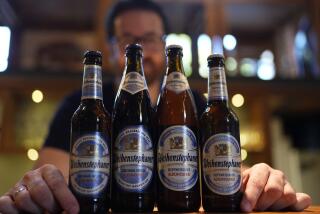South Yemen’s Only Brewery Stays in Business Despite Islamic Distaste for Alcohol
- Share via
ADEN, South Yemen — The Arabian peninsula’s only brewery clings precariously to its tradition of producing fine beers while all around Islamic pressure builds against alcohol.
Brewing has long been banned in South Yemen’s strict northern neighbor, and across the Muslim world the shutters are closing on breweries established during colonial days.
In the last few years, breweries have closed in Pakistan and Sudan. Iran lost six at one time, and now the pressure to adhere to Islam’s proscription of alcohol is mounting in South Yemen.
Workers employed at Aden’s Seera Beer factory are shunned for producing alcohol, which is contrary to Islamic teaching. Families wash their clothes separately and men have trouble finding brides, according to the plant’s West German manager, Eckhardt Zitzmann.
“One man finally had to go to Algeria to find a wife,” Zitzmann said.
But in socialist South Yemen, the Arab world’s most leftist state, not all are ashamed of their country’s secular ways.
“In the (Persian) Gulf, liquor is banned, but you go into people’s houses there and you find complete bars,” said one Yemeni. “Here we aren’t hypocrites. If you want to go to a bar, you can. If you want to go a mosque, you can.”
Zitzmann said Seera is the impoverished government’s No. 1 revenue earner, with beer taxed a thumping 600%. A bottle costs about $3.
Average consumption is only about three or four quarts per person per year, but in Aden, the capital, it is much higher. Zitzmann said the quality of his beer matches American and European standards.
Yemenis drink mainly at night at small bars away from residential areas.
In some neighborhoods they buy beer from small openings in walls through which the seller can scarcely be seen, then sit on the ground in circles of friends, far from the disapproving eyes of their wives.
Yemenis chew qat, a leaf containing a mild stimulant, while drinking beer, which enhances the effect. In South Yemen qat is permitted only on non-work days--Thursday and Friday.
Diplomats say there is increasing pressure, if indirect, from Saudi Arabia and North Yemen to close the brewery.
Zitzmann was a brewer in Iran before and after the 1979 Islamic revolution. As other breweries closed, he switched to non-alcoholic beer, then came to Aden to help start up the Seera factory in 1980.
He said the plant plans to begin exporting its beer and is preparing a non-alcoholic version as well.
More to Read
Sign up for Essential California
The most important California stories and recommendations in your inbox every morning.
You may occasionally receive promotional content from the Los Angeles Times.










